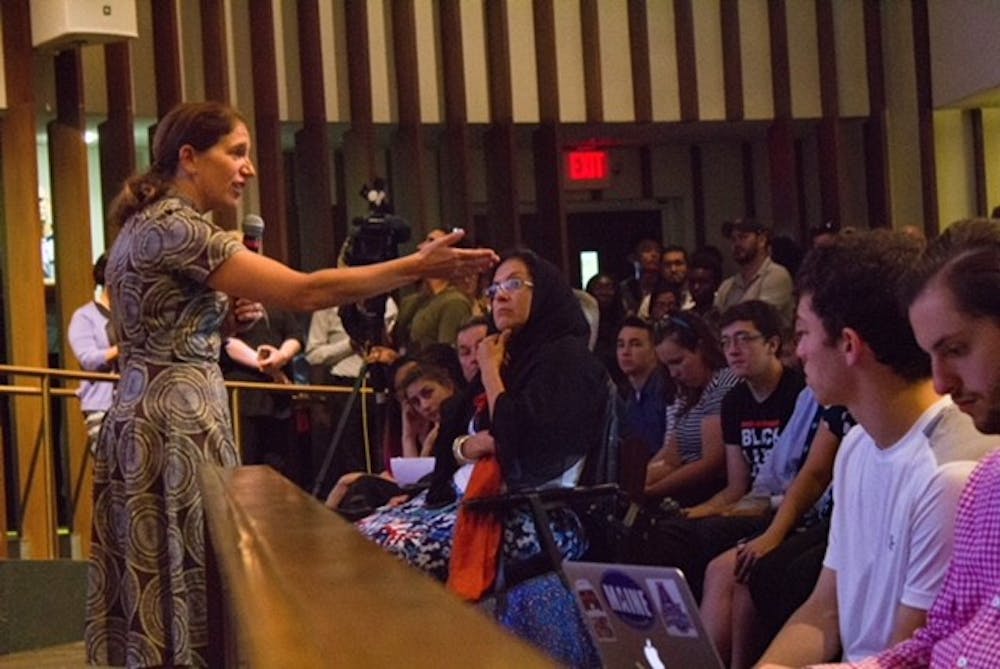At an emotional town hall Wednesday, American University President Sylvia Burwell said she was “angry and sick” after Confederate flag fliers with cotton plants attached to them were posted in at least four campus buildings Tuesday night.
“I don’t understand this kind of hate,” Burwell said through tears. “An attack on one of us is an attack on all of us.”
Burwell began the community meeting in the Kay Spiritual Life Center by speaking about Dr. Ibram X. Kendi's work as the founder of the Antiracist Research and Policy Center at AU. Kendi was hired in May to lead the center, and he gave a presentation about his plans for the center Tuesday evening.
Following Kendi's History of Racism class last night in the basement of Battelle-Tompkins, Kendi and his students discovered a Confederate flag poster beneath a sign for the Center for Israeli Studies. Kendi said he was heartbroken.
“Around 10:30, 10:40, we came out as a class and saw these posters and I had to see the emotional reaction of students,” Kendi said.
Later in the town hall, Kendi said he "personally expected what happened last night" because the anti-racist work he and others plan to do "threatens people."
.@DrIbram says May hate crime did not phase him. He wanted to be close to the activism and work that black students were doing.
— The Eagle (@TheEagleOnline) September 27, 2017
Phillip Morse, the Assistant Vice President of University Police Services, spoke on behalf of Public Safety. He reassured attendees that campus police, investigators and civilian staff worked hard throughout the night collecting physical evidence and are continuing to share information with the Metropolitan Police Department. He also mentioned that after searching through security footage, campus police suspected that the crime was committed by a 5’10 white male around 40 years of age.
“We hope that by the end of the day, that we have identified this person, that we can take our evidence to the U.S. Attorney's office that always guides us in making the appropriate charges with the most severe penalty for this type of crime," Morse said, adding that Public Safety would release more videos showing different angles of the suspect.
Regional Director of the Anti-Defamation League Doron Ezickson, who spoke at the town hall, said he was moved by the University’s response to hold the town hall. As the director of an organization that regularly monitors terrorist groupsand works with universities across the country, Ezickson said that he has witnessed hundreds of similar incidents, including some at local universities Georgetown and George Washington.
“The intent of these groups and these individuals are trying to disrupt others lives,” Ezickson said, “We cannot let them win.”
Student Government President Taylor Dumpson, who was targeted in a May hate crime, had the mic for over seven minutes, drawing attention to the “over 20 statements” and action steps that were discussed at a May 4 town hall.
Dumpson asked for an increase in campus security and the number of cameras as well as a consistent procedure for hate crimes. She said she worked with administrators this summer to create a space on the third floor of the Mary Graydon Center for multicultural students and that the project was still in the works.
She asked administrators to publicly release survey data about AU’s campus climate and to take action to protect students from people coming to campus to commit bias-related crimes.
“I’m a senior, and there has not been one year, one semester where there hasn't been a bias-related, motivated attack on black students, students of color, students from other marginalized communities,” Dumpson said during the meeting. “What we’re asking for is, instead of talking about it, we're looking for action steps.”
Other students stood to ask for more action from university administrators, citing AU’s lack of diversity among faculty and students. Sydney Jones, a junior and co-president of AU’s NAACP chapter, said that the University’s 6% black student population and 14% black faculty population was “not diverse.”
“I’ve heard a lot of sorries and tears, but no action,” Jones said. “Black students still don’t have a place on campus, and we’ve been asking for this since our freshman year…I’d like to stop saying that this is an everybody problem because it’s clearly a black student problem. We need to address black students’ problems. We share our spaces with everybody and it’s not fair.”
While some students vocalized the desire to have more Public Safety officers patrolling campus, especially during late hours, others felt that more police officers would pose a threat for black students and students of color on campus.
Black student speaker: I've seen more police presence at AU, but police were not able to stop man from putting up posters.
— The Eagle (@TheEagleOnline) September 27, 2017
Fanta Aw, the University’s vice president of campus life, said she wanted to hear more feedback on striking a balance between police presence and security.
"We do not want to be that campus where every time you turn, there is police presence," Aw said.
Zariyah Morvan, the School of Communication’s student council president, blamed administrators and AU’s campus culture for the repetition of racist incidents and hate crimes.
“I hear all these things about ‘this does not represent who we are as a school, this does not represent the spirit of AU,’ but if someone who doesn’t go here … feels comfortable and bold enough to walk onto this campus to spread their hate, that means that there is something in the culture here that is allowing that,” Morvan said. “It’s the administration’s fault that this happened multiple times.”
Burwell repeatedly told student speakers: “I hear you.” She ended the meeting by committing to “changing the conversation” around racism on campus as well as take action and implement new policies.
“There is not a day that I will go to bed ... [and] feel like we have done enough,” Burwell said. “We will do more.”





